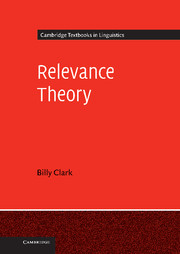Book contents
- Frontmatter
- Contents
- List of Figures and tables
- Preface
- Acknowledgements
- Typographical conventions
- Part I Overview
- 1 A first outline
- 2 Origins and alternatives: Grice, relevance theory and modern pragmatics
- 3 Principles of Relevance
- 4 Explaining inferences
- Part II Details and developments
- Appendix Key notions of relevance theory
- Notes to chapters
- Bibliography and other resources
- Index
1 - A first outline
from Part I - Overview
Published online by Cambridge University Press: 05 June 2013
- Frontmatter
- Contents
- List of Figures and tables
- Preface
- Acknowledgements
- Typographical conventions
- Part I Overview
- 1 A first outline
- 2 Origins and alternatives: Grice, relevance theory and modern pragmatics
- 3 Principles of Relevance
- 4 Explaining inferences
- Part II Details and developments
- Appendix Key notions of relevance theory
- Notes to chapters
- Bibliography and other resources
- Index
Summary
Topics: expectations and meanings; sentences, utterances and propositions; communication and cognition
Overview
The ideas introduced in this chapter are presented more fully in the remaining chapters of Part I before the more critical and exploratory discussion in Part II. The chapter begins with a very brief summary of the central ideas behind relevance theory. It then considers some issues about terminology before presenting a fuller introduction to the theory, looking at some of the key ideas involved in explaining communication from a relevance-theoretic point of view.
One of the key ideas assumed by relevance theory, and shared by most other approaches, is that we can make a fundamental distinction between coded and inferred communication. This distinction can then be exploited in making a distinction between linguistic semantics and pragmatics. This chapter considers some of the kinds of things which can be linguistically encoded (and which therefore fall within the scope of linguistic semantics) and some of the kinds of things which can be pragmatically inferred (and which therefore fall within the scope of pragmatics). We then take our first look at the theoretical ideas proposed by relevance theory to explain how we work out communicated meanings, in particular at the two Principles of Relevance, the presumption of optimal relevance and the relevance-guided comprehension heuristic which follows from these. Finally, we consider the nature of explanations of communication proposed within relevance theory.
- Type
- Chapter
- Information
- Relevance Theory , pp. 3 - 42Publisher: Cambridge University PressPrint publication year: 2013



